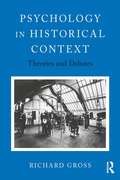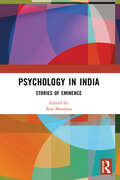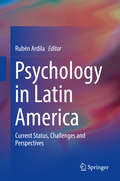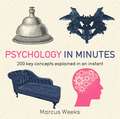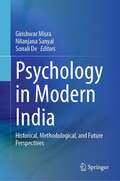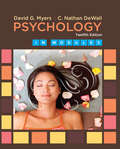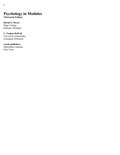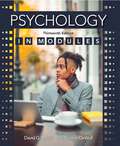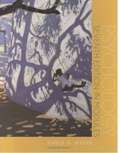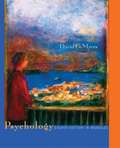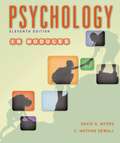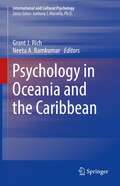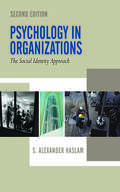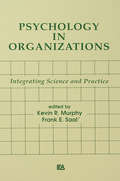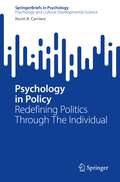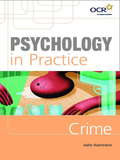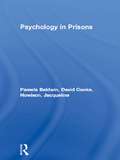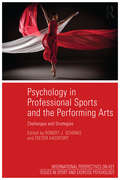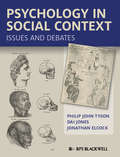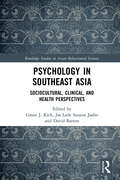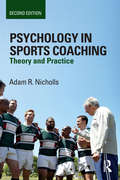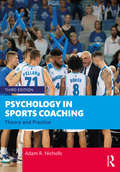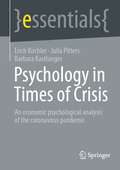- Table View
- List View
Psychology in Historical Context: Theories and Debates
by Richard GrossPsychology, the study of mind and behaviour, has developed as a unique discipline in its brief history. Whether as it currently takes place, or how it has been conducted over the past 140 years or so since it became recognized as a separate field of study, there has been constant debate on its identity as a science. Psychology in Historical Context: Theories and Debates examines this debate by tracing the emergence of Psychology from parent disciplines, such as philosophy and physiology, and analyzes key topics such as: the nature of science, itself a much misunderstood human activity often equated with natural science; the nature of the scientific method, and the relationship between data gathering and generalization; the nature of certainty and objectivity, and their relevance to understanding the kind of scientific discipline Psychology is today. This engaging overview, written by renowned author Richard Gross, is an accessible account of the main conceptual themes and historical developments. Covering the core fields of individual differences, cognitive, social, and developmental psychology, as well as evolutionary and biopsychology, it will enable readers to understand how key ideas and theories have had impacts across a range of topics. This is the only concise textbook to give students a thorough grounding in the major conceptual ideas within the field, as well as the key figures whose ideas have helped to shape it.
Psychology in India: Stories of Eminence
by Braj BhushanThis volume presents the life and work of 62 prominent Indian psychologists with each chapter illustrating their life and work. The nature and framework of each chapter is uniform, encompassing a brief biography, of the psychologists, their affiliations with various institutions and most prominently, their contributions to the field of psychology.The major highlight of the book is the collection of work of Indian scholars recorded in the form of research articles, book chapters and books, some of which were even used to develop models by Western scholars, but never received their due credit. The research activities conducted at universities and institutions have been the backbone of scientific progress and they are also highlighted here, especially the contributions of the Research Designs and Standards Organisation (RDSO), Lucknow, Defence Institute of Psychological Research (DIPR), Delhi, and Institute of Banking Personnel Selection (IBPS), Mumbai.This is the first book of this kind that chronologically presents the life and work of Indian psychologists. It will be useful to students of Psychology, Behavioural Sciences, Sociology and Social Work. It will also be an invaluable reference text for those working on the history of psychology.
Psychology in Latin America: Current Status, Challenges and Perspectives
by Rubén ArdilaThis contributed volume is a real “who is who” in Latin American psychology. Edited by the most prominent psychology researcher alive in the region, the book presents a comprehensive panorama of psychology in Latin America as a science, as a profession and as a way of improving the quality of life of individuals and communities. Despite its achievements, Latin American psychology is little known by the international psychological community. In order to fill this gap, Dr. Rubén Ardila has invited the most important researchers and practitioners in the region to present an overview of psychology as both a profession and a research field in Latin America in the following areas:· Scientific research· Professional issues· Clinical and health psychology· Developmental psychology· Educational and school psychology· Organizational and work psychology· Social psychology· Community psychology· Legal and forensic psychology Psychology in Latin America – Current Status, Challenges and Perspectives seeks to place Latin American psychology on the map of international psychology, and by doing so it aims to foster cooperation between researchers, practitioners and students from the region with its peers from all over the world.
Psychology in Minutes
by Marcus WeeksTo what extent is memory based on mood? Why do we compare ourselves to others? Are there different types of intelligence? How do we change with age? This book answers all these questions and many more in 200 short and accessible essays.From Pavlov's dogs to experimental ethics and from the development of personality to cognitive behavioral therapy, this book will take you from the foundations of psychological thought to modern-day applications, drawing on recent research and established theories. Each essay is accompanied by an illustration or diagram to help unravel complex ideas.The principles of psychology apply to each and every one of us as they shed light on everything from our childhood development to our interaction with others--and Psychology in Minutes is the perfect insight to this fascinating subject.Contents include: Behaviorism, Experimental ethics, Problem solving, Illusions and paradoxes, Dream analysis, Management and leadership, Compliance and conformity, Attitudes and prejudices, Attraction, Moral development, Gender development, The big five personality traits, Classification of mental disorders, Criticisms of psychoanalysis, Positive psychology, Advertising and the media and The working environment.
Psychology in Minutes: 200 Key Concepts Explained in an Instant
by Marcus WeeksTo what extent is memory based on mood? Why do we compare ourselves to others? Are there different types of intelligence? How do we change with age? This book answers all these questions and many more in 200 short and accessible essays. From Pavlov's dogs to experimental ethics and from the development of personality to cognitive behavioural therapy, this book will take you from the foundations of psychological thought to modern-day applications, drawing on recent research and established theories. Each essay is accompanied by an illustration or diagram to help unravel complex ideas. The principles of psychology apply to each and every one of us as they shed light on everything from our childhood development to our interaction with others - and Psychology in Minutes is the perfect insight to this fascinating subject. Contents include: Behaviourism, Experimental ethics, Problem solving, Illusions and paradoxes, Dream analysis, Management and leadership, Compliance and conformity, Attitudes and prejudices, Attraction, Moral development, Gender development, The big five personality traits, Classification of mental disorders, Criticisms of psychoanalysis, Positive psychology, Advertising and the media and The working environment.
Psychology in Minutes: 200 Key Concepts Explained in an Instant (IN MINUTES)
by Marcus WeeksTo what extent is memory based on mood? Why do we compare ourselves to others? Are there different types of intelligence? How do we change with age? This book answers all these questions and many more in 200 short and accessible essays. From Pavlov's dogs to experimental ethics and from the development of personality to cognitive behavioural therapy, this book will take you from the foundations of psychological thought to modern-day applications, drawing on recent research and established theories. Each essay is accompanied by an illustration or diagram to help unravel complex ideas. The principles of psychology apply to each and every one of us as they shed light on everything from our childhood development to our interaction with others - and Psychology in Minutes is the perfect insight to this fascinating subject. Contents include: Behaviourism, Experimental ethics, Problem solving, Illusions and paradoxes, Dream analysis, Management and leadership, Compliance and conformity, Attitudes and prejudices, Attraction, Moral development, Gender development, The big five personality traits, Classification of mental disorders, Criticisms of psychoanalysis, Positive psychology, Advertising and the media and The working environment.
Psychology in Modern India: Historical, Methodological, and Future Perspectives
by Girishwar Misra Nilanjana Sanyal Sonali DeThis book offers a critical account of the conceptual, theoretical, and methodological developments in key areas of psychology in India, providing insights into the developments and advances as well as future directions. Filling an important gap in the literature on the history of psychology in India, it brings together contributions by leading scholars to present a clear overview of the state of the art of the field. The thematic parts of the book discuss the historical perspectives: development of psychology in India; research methodologies in the West and India; future directions for research in the field. The book is of special interest to researchers, school administrators, curriculum designers, and policymakers.
Psychology in Modules
by David Myers C. DewallIn this version of Psychology, Twelfth Edition, David Myers and Nathan DeWall break down the new edition's?16 chapters into 53 modules, assignable in any sequence and brief enough to be read in one sitting. It's a format favored by a wide range of students and instructors, one that's supported by substantial research showing that students working with shorter reading assignments develop a deeper understanding of the material. The new edition of Modules includes the same new features and content of Psychology, Twelfth Edition, including hundreds of new citations and new infographics.
Psychology in Modules
by David G. Myers C. Nathan DeWallDavid Myers’ new partnership with coauthor C. Nathan DeWall matches two dedicated educators and scholars, each passionate about teaching psychological science through writing and interactive media. With this new edition of the #1 bestselling Psychology, Myers and DeWall take full advantage of what an integrated text/media learning combination can do. New features move students from reading the chapter to actively learning online: How Would You Know puts students in the role of scientific researcher and includes tutorials on key research design principles; Assess Your Strengths self-tests help students learn a little more about themselves, and include tips about nurturing key strengths. These and other innovations rest on the same foundations that have always distinguished a new David Myers edition—exhaustive updating (hundreds of new citations), captivating writing, and the merging of rigorous science with a broad human perspective that engages both the mind and heart.
Psychology in Modules
by David G. Myers C. Nathan DeWallIn Psychology, Thirteenth Edition in Modules, David Myers and Nathan DeWall break down the content of the new edition of their chapter-based Psychology into 55 independent modules, assignable in any sequence and brief enough to be read in one sitting. This flexible format is favored by a wide range of students and instructors, and supported by research showing that students working with shorter reading assignments are better able to retain the concepts. From its beginnings to this remarkably fresh and current new edition, Myers and DeWall have found extraordinarily effective ways to involve students with the remarkable research underlying our understanding of human behavior. But while the content and learning support evolves edition after edition, the text itself continues to be shaped by basic goals David Myers established at the outset, including to connect students to high-impact research, to focus on developing critical thinking skills, and to present a multicultural perspective on psychology, so students can see themselves in the context of a wider world.This new edition offers 2100 research citations dated 2015–2020, making these the most up-to-date introductory psychology course resources available. With so many exciting new findings, and every chapter updated with current new examples and ideas, students will see the importance and value of psychological research, and how psychology can help them make sense of the world around them. The abundant, high quality teaching and learning resources in LaunchPad and in Achieve Read & Practice, carefully matched to the text content, help students succeed, while making life easier and more enjoyable for instructors.
Psychology in Modules (7th Edition)
by David G. MyersThe unique feature of this book is that it contains 55-module text on psychology in an easily digestible capsule format.
Psychology in Modules (8th Edition)
by David G. MyersThis eighth modular edition of David G. Myers' 'Psychology' includes expanded coverage of the most recent developments in the dynamic fields of cognitive science, neuroscience, cultural and gender diversity, and industrial/organizational psychology.
Psychology in Modules, 11th Edition
by David G. Myers C. Nathan DewallIn this version of Psychology, Eleventh Edition, David Myers and Nathan DeWall break down the new edition's 16 chapters into 55 modules, assignable in any sequence and brief enough to be read in one sitting. It's a format favored by a wide range of students and instructors, one that's supported by substantial research showing that shorter reading assignments are more easily absorbed than longer ones.The new edition of Modules includes the same new features and content of Psychology, Eleventh Edition, and like that text, is more than ever a fully integrated text/media learning package. New features (How Would You Know; Assess Your Strengths) move students from reading the chapter to actively learning online. Those features and more are included in the book's dedicated version of Worth Publishers' breakthrough online course space, LaunchPad, which brings together a fully integrated e-Book, LearningCurve adaptive quizzing, a rich collection of student media resources, and easy setup, assessment, and course management options for instructors. What's in the LaunchPad
Psychology in Oceania and the Caribbean (International and Cultural Psychology)
by Grant J. Rich Neeta A. RamkumarThe Caribbean and Oceania are understudied areas from a psychological perspective, and this book is designed to fill that knowledge gap. In addition to diverse, rich cultural traditions and abundant economic opportunity for some, these regions also reflect the challenges of modernity, including crime, poverty, ethnic tensions, adaptations to climate change, and disparities in health, education, and access to care. With contributions from noted psychologists in the Caribbean and Oceania, as well as experts from around the globe, this book provides nuanced examination of significant psychological issues in nations such as Fiji, Guyana, Belize, Haiti, Jamaica, and more. Psychologists, psychiatrists, and other mental health professionals with an interest in this part of the world, will find this volume a rich resource, as will those generally interested in the relationship between culture and psychology. This book takes you on an outstanding journey of what is occurring in cultural psychology in the 21st century. It addresses the abundance of each nation through a transformational lens of current practices in psychology in Oceania and the Caribbean. I would absolutely recommend it to anyone interested in sailing the high seas connecting the present with the endless possibilities of those who dare to journey into the waters of a divine future.”- Florence Denmark, Past-President, American Psychological Association "Chock full of expert knowledge and insights, Psychology in Oceania and the Caribbean is an indispensable resource for psychologists. A must-read that will expand your understanding of life in these regions and beyond! “- Pamela A. Hays, PhD, Author of Addressing Cultural Complexities in Practice "This is a breath-taking book in its coverage of the uniquely endowed psychology worlds of Oceania and the Caribbean. Now that Dr. Rich, Dr. Ramkumar, and colleagues have produced this awesome book volume on the cultural psychology of the rim water nations, I have a palpable sense of relief from their having addressed a huge gap in cultural psychology scholarship. This volume opens hitherto undreamed of opportunities for further studies on cultural practices in psychology in Oceania and the Caribbean!”- Elias Mpofu, PhD, DE.D, CRC, MAPS, Professor of Health Sciences at the University of North Texas, Honorary Professor of Health Sciences at the University of Sydney and Executive Board member of the Australian Psychological Society’s Rehabilitation Psychology Interest Group"This book represents a vital exploration into the purpose and practice of Psychology in island nations. It is a welcome compilation of academic writings from sociocultural perspectives within Oceania and the Caribbean and serves as a landmark account of the unique forces shaping the development and evolution of Psychology in these states." - Gerard Hutchinson MD, Professor of Psychiatry, University of the West Indies, St Augustine, Trinidad and Tobago
Psychology in Organizations
by S. Alexander HaslamAlex Haslam has thoroughly revised and updated his ground-breaking original text with this new edition. While still retaining the highly readable and engaging style of the best-selling first edition, he presents extensive reviews and critiques of major topics in organizational psychology - including leadership, motivation, communication, decision making, negotiation, power, productivity and collective action - but with much more besides. Key features of this 2nd Edition: · An entirely new chapter on organizational stress which deals with highly topical issues of stress appraisal, social support, coping and burnout. · New, wider textbook format and design making the entire book much more accessible for students. · Wide range of pedagogical features included - suggestions for further reading included at the end of each chapter; comprehensive glossaries of social identity, social psychological and organizational terms.
Psychology in Organizations: integrating Science and Practice (Applied Psychology Series)
by Kevin R. Murphy Frank E. SaalThis book deals with two key questions. First, is there a firm scientific basis for the major applications of psychology in organizations? Second, does the practice of psychology in organizations contribute in any meaningful way to psychological research? This text attempts to answer these questions by describing some of the unique ways in which Industrial/Organizational (I/O) psychologists integrate science and practice in applying psychology in organizations. The editors of this volume believe that there is great potential for the effective interplay of science and practice in I/O psychology. Aware, however, that much work must still be done before a truly effective integration can be achieved and maintained, they have created a text that offers specific suggestions for improvement as well as many examples of successful integration. Psychology in Organizations explores the unique relationship between science and practice within industrial/organizational psychology. The contributors seek to answer two main questions: * Is there a firm scientific basis for the major applications of psychology in organizations? * Does the practice of psychology in organizations contribute in any meaningful way to psychological research? After an initial examination of the industrial/organizational psychologist as a scientist and practitioner, Psychology in Organizations looks at specific roles played in such issues as job performance and productivity, sexual harassment, drug abuse, and drug testing. A final chapter looks at both the past and future of the field and suggests future applications.
Psychology in Policy: Redefining Politics Through The Individual (SpringerBriefs in Psychology)
by Kevin R. CarriereThis book takes an insider perspective of the psychological issues of creating policy. Instead of considering what the products of policy are - often the case in psychological and political science work - this book examines the individual processes present in proposing and engaging with policy. The individual who engages with the policy and its meanings, the individual who resists the policy through conformity, and the individual who writes the policy for their own ideological purposes are all political actors in a psychological system. This book puts forward a cultural political psychology as the psychological study of the process of values, policy, and power dynamics. Through exploring public policy through private policy generation and individual interaction, this book pushes theoretical understandings of policy and activism in new ways. Centering on an individual’s own values in facing various policy restrictions from governments, parents, or peers, the importance of examining collective actions and also collective inactions of individuals is noted and expanded on in the text. The book provides applications of its arguments through examining the processes of unionization and actualized democracy. It seeks to point out new research avenues, including the hypogeneralization of values, one’s exclusion through activism, and everyday revolutions. This book addresses the centrality of the individual and meaning-making systems when considering where policy, politics, and psychology intersect. This book is primarily addressed to psychologists and political scientists interested in how to make change in public policy. While the experiences within the book are United States-centric, the thoughts and theories behind them are meant to be applicable to a wide variety of political systems. As there is currently very little literature on the topic, this book seeks to fill the gap and offer concise information on such an important dimension of cultural and political psychology. It is expected that the book will be of great interest for researchers in these areas, as well as for graduate-level students. In particular, this book will be relevant to researchers and students working on political psychology, public policy, development, community psychology, social representations, semiotics, activism, and social movements, to name a few.
Psychology in Practice: Crime
by Julie HarrowerPsychology in Practice is the definitive six-part series on the practical applications of psychology to areas of everyday life, covering crime, education, health, sport, organisations and the environment. Each book in the series examines one unit of the Applications of Psychology section of the OCR syllabus. Psychology in Practice: Crime covers the application of psychology to our understanding of criminal behaviour. Forensic psychology has significantly expanded over recent years and now makes a valuable contribution to the investigation of crime, the development of treatment programmes for offenders, crime prevention, and research which can provide the basis of expert testimony in the courtroom. Key learning aids include: - a set of key terms for each chapter- practical exercises- section summaries and overall main chapter points- recommended further reading and web sites- sample examination questions based on OCR specimen materials.
Psychology in Prisons
by David Cooke Pamela Baldwin Jacqueline HowisonPsychology in Prisons illustrates how a knowledge of psychological principles can lead to a better understanding of the prison environment and the problems that occur within it. The authors show how psychology can be used to increase understanding of prisoners and to deal with day-to-day problems in prison life. They focus on key problem areas such as sex offenders, violent criminals and the issue of AIDS. The book also explores the effects of the prison environment on staff and suggests means of reducing the levels of stress.
Psychology in Professional Sports and the Performing Arts: Challenges and Strategies (Key Issues in Sport and Exercise Psychology)
by Robert J. Schinke Dieter HackfortThe relationship between sport and exercise psychology and the realm of professional sport and performance has grown exponentially in recent years. Elite athletes increasingly see the value in seeking psychological advice and expertise, while consultants now work in a wider range of elite performance environments. Psychology in Professional Sports and the Performing Arts: Challenges and Strategies is a unique and timely collection that brings together the experiences and knowledge of a range of applied psychologists working in these exciting industries. The book begins with a section outlining the core skills practitioners require in the field, before chapters discussing individual sports, team sports and the performing arts. Each author looks at how theoretical principles can be applied within a particular professional context, delineating how performers may benefit from working with a psychologist, as well as the ethical and cultural challenges that they faced. Assessing the role of applied psychologists across a truly unique range of activities, from polo to motor racing and ice hockey to modern dance, Psychology in Professional Sports and the Performing Arts: Challenges and Strategies offers unrivalled insights into how sport and exercise psychology can be put into practice in challenging professional environments. It will appeal to anyone studying sport and exercise psychology, or working in the field.
Psychology in Social Context: Issues and Debates
by Philip John Tyson Dai Jones Jonathan ElcockPsychology in Social Context: Issues and Debates provides a critical perspective on debates and controversies that have divided opinion within psychology both past and present. Explores the history of psychology through examples of classic and contemporary debates that have split the discipline and sparked change, including race and IQ, psychology and gender, ethical issues in psychology, parapsychology and the nature-nurture debate Represents a unique approach to studying the nature of psychology by combining historical controversies with contemporary debates within the discipline Sets out a clear view of psychology as a reflexive human science, embedded in and shaped by particular socio-historical contexts Written in an accessible style using a range of pedagogical features - such as set learning outcomes, self-test questions, and further reading suggestions at the end of each chapter
Psychology in Southeast Asia: Sociocultural, Clinical, and Health Perspectives (Routledge Studies in Asian Behavioural Sciences)
by Grant J. RichDespite diverse, rich cultural traditions and abundant economic opportunity, there has been a paucity of research on psychology in Southeast Asia. This book aims to fill that gap, with a series of well-written theoretical and empirical chapters by PhD psychologists in SE Asia along with respected international colleagues and co-authors from around the globe. In particular this book focuses upon critical sociocultural, clinical, and health issues and perspectives in psychology in Southeast Asia. Overviews help contextualize the cultural data, permitting nuanced examination of significant psychological issues in nations such as Malaysia, Indonesia, Thailand, Singapore, and more. Psychologists and mental health professionals with interests in Asia will find this book to be a must-read, as will other readers seeking to deepen their cultural and international understanding.
Psychology in Sports Coaching: Theory and Practice
by Adam R. NichollsSome of the most effective coaches understand the fundamentals of sport psychology, which include interacting effectively with athletes, creating the optimal environment, assessing the psychological needs of their athletes, and even providing them with the mental training required to maximise performance. Fully revised and updated, the second edition of Psychology in Sports Coaching: Theory and Practice clearly and accessibly introduces the principles and practice of sport psychology in the context of the coaching process. Drawing on the very latest research and theory, the book introduces the psychological tools and techniques that coaches can use to get the best performances out of their athletes. Including six new chapters on applying self-determination principles in coaching, creating the optimal motivational climate, increasing motivation, developing anti-doping attitudes, promoting challenge states, and mindfulness-based stress reduction training, the book also offers step-by-step guidance on key topics such as: Assessing the needs of athletes Facilitating awareness through goal-setting and performance profiling Working with special populations, including children and injured athletes Building team cohesion Maximising relationships and socially supporting athletes Teaching mental skills such as imagery and coping Building mental toughness and confidence. Every chapter contains useful features to aid learning and understanding, including in-depth case studies, critical thinking questions, clear and concise summaries, and practice exam questions. Psychology in Sports Coaching: Theory and Practice is essential reading for any student of sports coaching or any practising coach looking to extend and develop their skills, and useful applied reading for students of sport psychology.
Psychology in Sports Coaching: Theory and Practice
by Adam R. NichollsThe most effective coaches understand the fundamentals of sport psychology, which include interacting effectively with athletes, creating the optimal environment, assessing the psychological needs of their athletes, and providing them with the mental training required to maximise performance. Fully revised and updated, the third edition of Psychology in Sports Coaching clearly and accessibly introduces the principles and practice of sport psychology in the context of the coaching process. Drawing on the very latest research and theory, the book introduces the psychological tools and techniques that coaches can use to get the best performances out of their athletes. Including three new chapters on the constraints approach to assessing psychological needs, mental imagery, managing perfectionism tendencies, and mentoring leaders, the book also offers step-by-step guidance on key topics such as: Assessing the needs of athletes Facilitating awareness through goal setting and performance profiling Coaching specialist populations effectively (e.g. children, adolescents, adults and athletes with learning disabilities) Reducing favourable attitudes towards doping Developing effective coach-athlete relationships Reducing choking under pressure Mindfulness techniques Mental imagery Every chapter contains useful features to aid learning and understanding, including in-depth case studies, critical thinking questions, clear and concise summaries, and practice exam questions. Psychology in Sports Coaching is essential reading for any student of sports coaching, or any practising coach looking to extend and develop their skills, and useful applied reading for students of sport psychology.
Psychology in Times of Crisis: An economic psychological analysis of the coronavirus pandemic (essentials)
by Erich Kirchler Julia Pitters Barbara KastlungerWhen the SARS-CoV-2 virus reached us in Europe, we panicked. Life was scaled down to the bare essentials and tentatively loosened up again. The lockdown is followed by huge changes. There is no return to familiar normality in sight. How did we experience the threat to our health and the changes to the familiar rituals of life? What followed shock and fear? How did we manage to discard long-rehearsed rituals and accept the challenges? How will we talk about the policies after the lockdown, what will we remember and what will we have learned from the crisis? This Essential offers an economic psychological analysis of the complex interplay between state, organisations and people from the beginning of the crisis to the repair phase.
